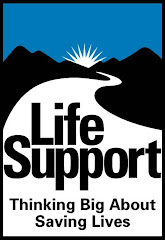The moonlight illuminates the sky as you drive along the rural road. Your wife rests in the seat next to you while your six month old daughter sleeps like an angel in the backseat. Suddenly, the car takes control. Slipping and sliding, the scenery outside is a blur.
Moments before, 40 miles away on Interstate 90, another family is racing down the highway to get to their destination. A deer jumps out of the forest and the two collide in battle. The call for help is received but who is there to help you?
Sadly, this nightmare becomes a frequent reality in the small community of Upper Kittitas County.
"Medical care is something many take for granted until it is needed," stresses Cheri Marusa, life-long Upper Kittitas County resident and Life Support Founder. "I heard too many stories about lives being compromised or lost and I knew something had to be done."
Upper Kittitas County serves as a gateway connecting Eastern and Western Washington through a 40-mile stretch of Washington's Interstate-90 (I-90) corridor. According to former Washington State Secretary of Transportation, Sid Morrison, this section of I-90 hosts over 12 million travelers each year.
Additionally, the area spans 800 square miles of countless recreational activities. Over two million visitors each year come to enjoy the areas three major lakes (Cle Elum, Easton, Kachess), numerous campgrounds, hiking trails and horseback-riding trails as well as the top-rated golf courses at the new Suncadia Resort. In the winter, skiing and snowboarding are just a quick trip to the Summit at Snoqualmie, while the surrounding area also invites snowmobilers, cross-country skiers, and snowshoers.
Unfortunately, due to the small community of 7,000 permanent residents, Upper Kittitas County does not have the tax-base to support the accelerating medical demands of the millions who travel and visit the area. Thus, when multiple incidents occur, lives are at stake.
When emergency calls are received, first aid units from local fire departments with volunteer emergency medical technicians (EMTs) are dispatched. However, insufficient tax-base funding often leaves the volunteers without the proper tools and equipment to assist those in need.
Recognizing the vast gap in the Emergency Medical System (EMS), a local group of community members, spearheaded by Marusa, vowed to work together with the local volunteer fire departments to make a difference. The nonprofit organization, Life Support was formed.
Established on the philosophy of giving back to the community, the organization raises funds to purchase medical and rescue equipment to protect and serve you and your family, as well as all who frequent the area.
For nine years, Life Support's community activists have given generously of their time and talents to ensure your emergency medical needs are met. "Life Support's efforts benefit every single person who crosses the boundary of these 800 square miles," Marusa explains. "Due to our commitment," she adds, "the volunteers are better equipped to assist and perhaps even save your life."
Easton Fire Chief Craig McKee is an avid supporter and volunteer for Life Support. Four years ago, Life Support purchased a Jaws of Life (a piece of equipment that assists with vehicle extrication in order to reach the victims) for his department. McKee explains, “[the department] would not have adequate tools and equipment if it weren’t for Life Support. We lacked vital equipment to get help to those in need. With the help of Life Support," he adds, "we can now get the job done!”
Lori Watts, a frequent area visitor and Life Support enthusiast, also has numerous family and friends who travel through Upper Kittitas County. “Life Support is a great bunch of people fulfilling a much needed mission,” Watts expresses, “and they get results.” According to Marusa, these results are due to “the generosity of our donors, countless volunteer hours, and a positive and progressive vision.”
Life Support’s efforts reflect a true commitment to community. “We are committed to helping our neighbors,” Marusa states. “Not just our permanent residential neighbors, but our neighbors who pass through,” she pauses, “even for a moment.”
Life Support is truly a grassroots organization. Run solely by volunteers, with contributions filling the needs of local EMS providers. To date, Life Support has raised over $4 million to purchase 4x4 aid units, extrication equipment, medical supplies, training and to build out the EMS infrastructure.
This year, Life Support will celebrate the groundbreaking of the first phase of three new EMS facilities, strategically stationed for fast response times. “We’ve come a long way,” Marusa reflects, “but there is more work to be done.”
From the beginning Life Support has focused on helping others. Life Support will continue to serve the residents, visitors, and travelers of the area.
The next time you travel through this Upper Kittitas County, you’ll know that you are traveling through a community that is working together to make a difference, a difference that may save your life.







